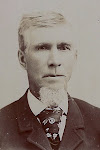Mom’s First Child &
Happy Anniversary to "The Pill"
[Published Mother’s Day, May 9, 2010]
For the second time in the past few days an article in the Minneapolis Star-Tribune got me pondering our Greater Ducklow family history. The “Moms’ new due date,” article [May 9, 2010] on the front page generally addressed the fact that women over the age of 40 are having babies more frequently than all other age groups. A small side bar to the article provided the following information:
National average age of women having first child:
21 in 1970s; 25 in 2006
I wondered about the Greater Ducklow family—what has been the average age of women in our family when they had their first child through the decades?
While I don’t have complete data for all births in the greater family, there is a good pool to work from. The table that follows is based on 321 women that are either descendants or spouses of descendants [see footnote] who have delivered at least one child (and where the age of the mother and date of the birth (or adoption) are known):
Greater Ducklow Family average age of women having first child (by decade):
1920s: 25.3 based on 12 births or adoptions
1930s: 24.8 based on 18 births or adoptions
1940s: 24.2 based on 22 births or adoptions
1950s: 23.8 based on 32 births or adoptions
1960s: 23.3 based on 30 births or adoptions
1970s: 22.7 based on 59 births or adoptions
1980s: 25.7 based on 49 births or adoptions
1990s: 28.0 based on 48 births or adoptions
2000s: 26.3 based on 51 births or adoptions
Prior to the 1920s, the data is too slim to analyze.
So compared then national average age presented in the Star-Tribune article, the women in Greater Ducklow family on average waited a year and half longer to start having children in the 1970s. And they waited about a year and a quarter longer than the national average in the 2000s. Matching the national trend, women in our family started having babies about four years later from the 1970s compared to 2000s.
A big reason why...
Half-used package of birth control pills. Image from Wikipeda Commons.
What the Star-Tribune article should have mentioned, but didn’t, was that it also happens to be the 50th anniversary—on Mother's Day 2010—of the Birth Control Pill [see footnote]. Use of this prescription in the decades since its advent has significantly empowered women to choose when they might become pregnant. Wide use came in the late 1970s when it was no longer illegal for unwed women to take them and improvements were made to formulas causing fewer side-effects. The "pill" as a birth control option no doubt is a major contributing factor in the rise of the age when women nationally, and certainly within our family, decided to have their first child.
So Happy Mother’s Day. And Happy Anniversary, Birth Control Pill.
❧
Footnote: Descendants or spouses of descendants of Thomas and Elizabeth Ducklow, the ancestral grandparents of most of the Ducklows living in the United States.
Footnote: See link from U.S. News and World Report: http://health.usnews.com/health-news/womens-health/articles/2010/05/07/birth-control-pill-turns-50-7-ways-it-changed-lives.html
❧



No comments:
Post a Comment